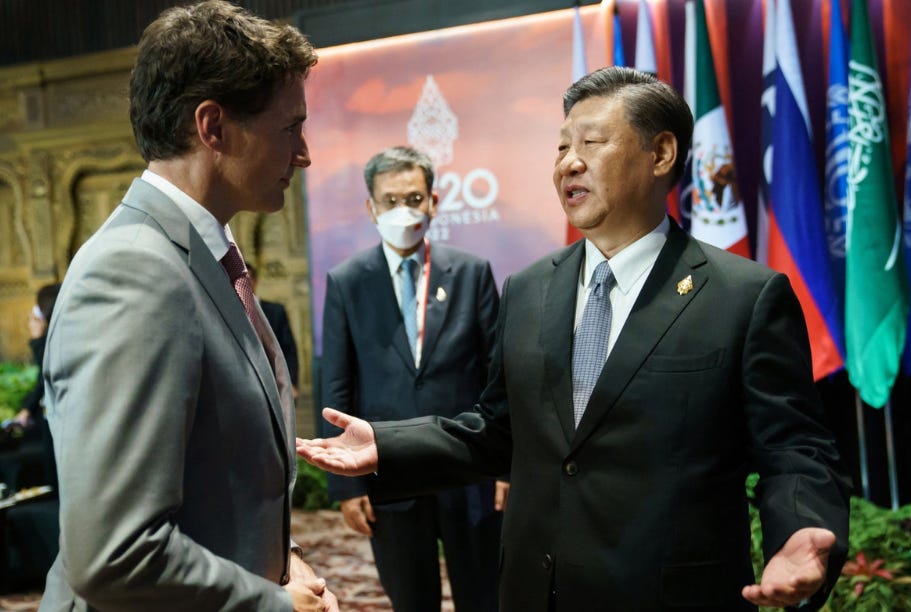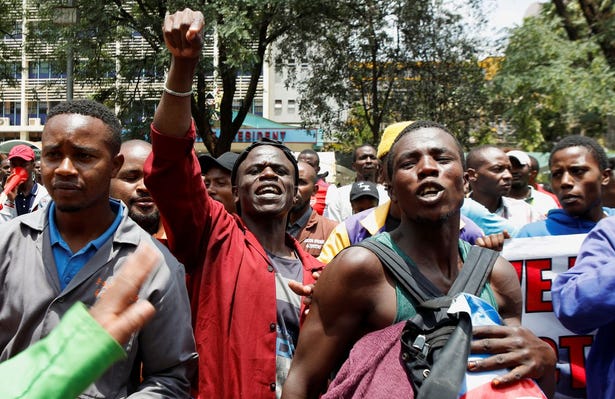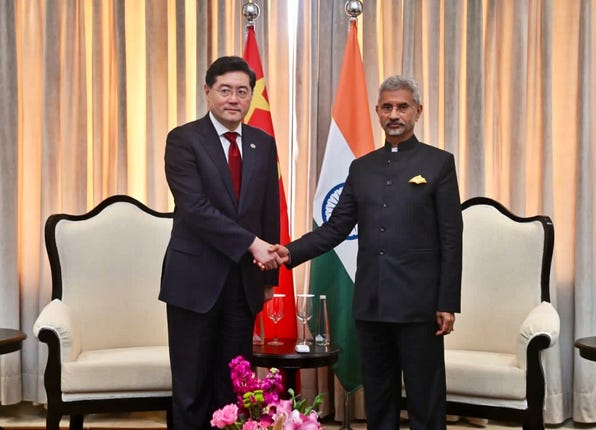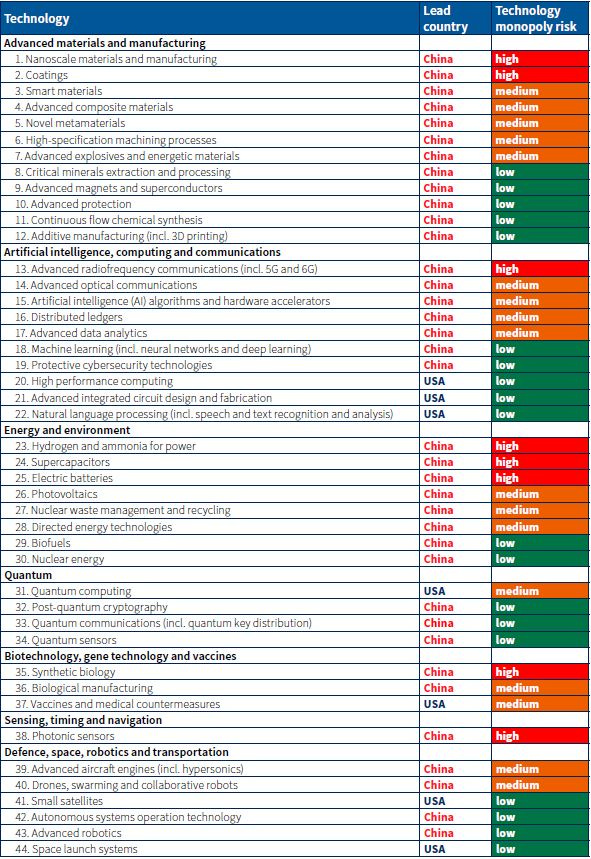The Evenstar Institute's Weekly Chinese Influence Bulletin 4 March 2023
China ops in Canada, Kenyan traders protesting, China-India meeting, Critical Tech Tracker
Hello and welcome back to What China Wants.
Every week we publish the newsletter of the Evenstar Institute, the parent of What China Wants and a think tank dedicated to measuring and understanding national influence in the 21st century.

ABOUT THE EVENSTAR BULLETIN
The Evenstar Institute's weekly bulletin comprises updates on changing global influence, macro supply chain events, and other China-related news. We will also highlight books, articles, events, and episodes of our podcast, What China Wants.
If you have any questions about the contents of the bulletin or the Institute's research, get in touch via our website.
INFLUENCE UPDATES
Documents reveal allegations of Chinese influence operations in Canada
Government and Administration
Leaked documents from Canada’s spy agency, CSIS, have reportedly shown how China attempted to influence Canada’s 2021 election. Robert Fife and Steven Chase of the Globe’s Ottawa bureau reported that China employed a sophisticated strategy to disrupt Canada’s election. The methods described include promoting candidates favourable to the regime, warning ‘friendly’ Canadians about investigations and targeting Canadians with cyberattacks, bribery and honey traps.
The classified reports have reportedly been viewed by the Globe. Drawn from a series of CSIS intelligence-gathering operations, the documents convey two alleged aims of Chinese influence operations: (1) to ensure that a minority Liberal government was returned in 2021; (2) certain Conservative candidates identified by China were defeated. The CSIS reports were previously shared among senior government officials and Canada’s Five Eyes intelligence allies prior to the leak.
The documents describe CCP leadership as “pressuring its consulates to create strategies to leverage politically [active] Chinese community members and associations within Canadian society”. The reports also describe an instance where China’s former consul general in Vancouver, Tong Xiaoling, boasted about how she helped defeat two Conservative MPs.
Prime Minister Trudeau has responded, stating that “ we are very concerned with the leaks, particularly because there are so many inaccuracies in those leaks”, although he did not specify which parts of the leaks were inaccurate. Meanwhile, the House of Commons procedure and House affairs committee unanimously agreed on 28 February to invite the Foreign Affairs and Intergovernmental Affairs Ministers for another round of questioning.
Kenyan traders protest against Chinese competitor’s cheap prices
Civil Society and Cultural and Demographic Reach Finance, Trade, and Investment
On 28 February, more than 1,000 Kenyan traders protested in Nairobi against a new Chinese-owned retail shop, China Square. Reuters has reported that the traders accused the shop of undercutting them with ultra-low prices; prices for everyday goods imported from China such as curtains were on average 50% cheaper than those brought by local traders. Lei Cheng, the owner of China Square, reportedly told a local newspaper that he was inspired to open the shop after finding prices at a Nairobi supermarket exorbitant.
The traders marched to the office of Kenya’s deputy president and to parliament to submit a petition against the Chinese retailers. The reaction from government ministers has been divided. Trade Minister Moses Kuria offered to take over China Square’s lease and hand it to local traders, but Korir Sing ‘oei, the Principal Secretary at Kenya’s Ministry of Foreign Affairs, stressed that all investors are welcome.
Source: REUTERS/Monicah Mwangi
Chinese Railway Project Resumed in Myanmar
Finance, Trade, and Investment Transport and Logistics
The news magazine Frontier has reported that China Railway Eruyan Engineering Group (CREEG), a Chinese state-owned company, had quietly resumed preliminary work on the Muse-Kyaukphyu rail project, a railway connecting southern China to the Rakhine State on the Myanmar coast.
The project is one of the flagship projects of the China-Myanmar Economic Corridor (CMEC), a set of projects designed to connect Yunnan province to Myanmar’s Indian Ocean coast. In addition to the railway, CMEC features plans for highways, border trade zones, and urban development projects. By providing China with access to the ocean, the project is integral to its ambitions to moderate its heavy reliance on the Straits of Malacca, a bottle-neck through which the majority of China’s oil imports flow.
The Memorandum of Understanding for the project was signed in 2011, but it has been repeatedly delayed. In particular, preparations for the second section of the line, linking Mandalay to Kyaukphyu, have stalled, due to a combination of factors including the COVID-19 pandemic, the chaos unleashed by the 2021 coup, and a general wariness on the part of Myanmar’s military administration, which remains cautious about sleep-walking into an overreliance on its large northern neighbour.
Despite these stirrings of activity, construction on the railway seems a long way off. A project of this complexity and cost would be challenging even in times of peace, but the security situation has only worsened along much of the planned route since the coup. However, the fact that the project is back on the agenda suggests that the Chinese government is doubling down on its support for the junta administration.
Chinese and Indian Ministers Hold Bilateral Meeting
Government and Administration
On 2 March Foreign Minister Qin Gang met with External Affairs Minister S. Jaishankar in India. The bilateral meeting took place at Rashtrapati Bhawan where foreign ministers gathered to take part in the G20 ministerial meeting.
Qin met with Jaishankar a day after Chinese foreign ministry spokesperson emphasised that “China attaches great importance to India”. Through his Twitter account, Jaishankar commented that their discussions were “focused on addressing current challenges to the bilateral relationship, especially peace and tranquillity in the border areas”.
Since May 2020, Indian and Chinese troops have been in a stand-off at multiple points in eastern Ladakh, with both sides accusing each other of encroaching across the loosely demarcated de facto border known as the Line of Actual Control. There have been several rounds of military and diplomatic talks since which have resulted in disengagement at four points through the creation of buffer zones. However, the standoff has continued at Demchok and Depsang, which has resulted in a stalemate.
Qin Gang, a career diplomat and Beijing’s former ambassador to the United States, was appointed to the post of Foreign Minister in January following Wang Yi’s promotion to the Politburo. His is the second visit by a Chinese minister to India since the stand-off at the Line of Actual began. Last year, Wang Yi travelled to New Delhi, but the visit has not resulted in a major breakthrough.
Source: Twitter/Dr. S. Jaishankar
OTHER NEWS
Sam was published in The Naval Review, making the case for renewed Royal Navy engagement with the Indo-Pacific theatre, not just in terms of military commitment, but also diplomatic positioning both in theatre and at home.
Critical Technology Tracker: The global race for future power
The Australian Strategic Policy Institute (ASPI) has published its new project, the Critical Technology Tracker. The report claims that Western democracies are losing the global technological competition, including the race for scientific and research breakthroughs and the ability to retain global talent – critical ingredients for the development and control of the world’s most important technologies.
The chief finding is that China is further ahead in more areas than had previously been realised. It is the global leading country in 37 of the 44 technologies that ASPI evaluated, often producing more than five times as much high-impact research as its closest competitor. These categories cover a range of crucial technology fields spanning defence, space, robotics, energy, the environment, biotechnology, artificial intelligence (AI), advanced materials and key quantum technology areas. Consequently, only seven of the 44 analysed technologies are currently led by a democratic country, and that country in all instances is the United States.
The tracker also conveys that for some technologies all of the world’s top 10 leading research institutions are based in China, and are collectively generating nine times more high-impact research papers than the second-ranked country. The authors also highlight China’s efforts as being bolstered through talent and knowledge import: 20% of its high-impact papers are being authored by researchers with postgraduate training in a Five-Eyes country.
The findings can be interpreted as a wake-up call for democratic nations to rapidly pursue a strategic critical technology step-up. The report highlights the gap in understanding of the critical technology ecosystem, including its current trajectory. China’s overall research lead, and its dominant concentration of expertise across a range of strategic sectors, has short and long term implications. Within the full report, the authors outline 23 policy recommendations for partners and allies to act on collaboratively and individually.
According to the authors, the key risk of China’s leading research position lies in the long term, because it is positioned to excel not just in current technological development in almost all sectors, but in future technologies that do not yet exist. “Unchecked, this could shift not just technological development and control but global power and influence to an authoritarian state where the development, testing and application of emerging, critical and military technologies is not open and transparent and where it can’t be scrutinised by independent civil society and media.”
We encourage readers to explore the data for themselves via the website, available here.
THE PODCAST
In the latest episode of What China Wants, Sam and Stewart discuss the issue of human rights in China. To do so, they are joined by Benedict Rogers, Co-Founder of Hong Kong Watch and one of Britain’s foremost and most knowledgeable campaigners on the subject.
We discuss some of the key issues raised in his book, The China Nexus, including allegations of human rights abuses in Hong Kong and Xinjiang, organ-harvesting from prisoners of conscience, as well as some of the criticisms commonly levelled at critics of China's human rights record.
You can also listen to the podcast on Apple, Amazon, or Spotify.
ABOUT THE EVENSTAR INSTITUTE
The Evenstar Institute is a non-partisan, not-for-profit think tank focused on measuring and understanding the evolving nature of national influence in the twenty first century.
If you would like to support us, please visit the donate page on our website.






